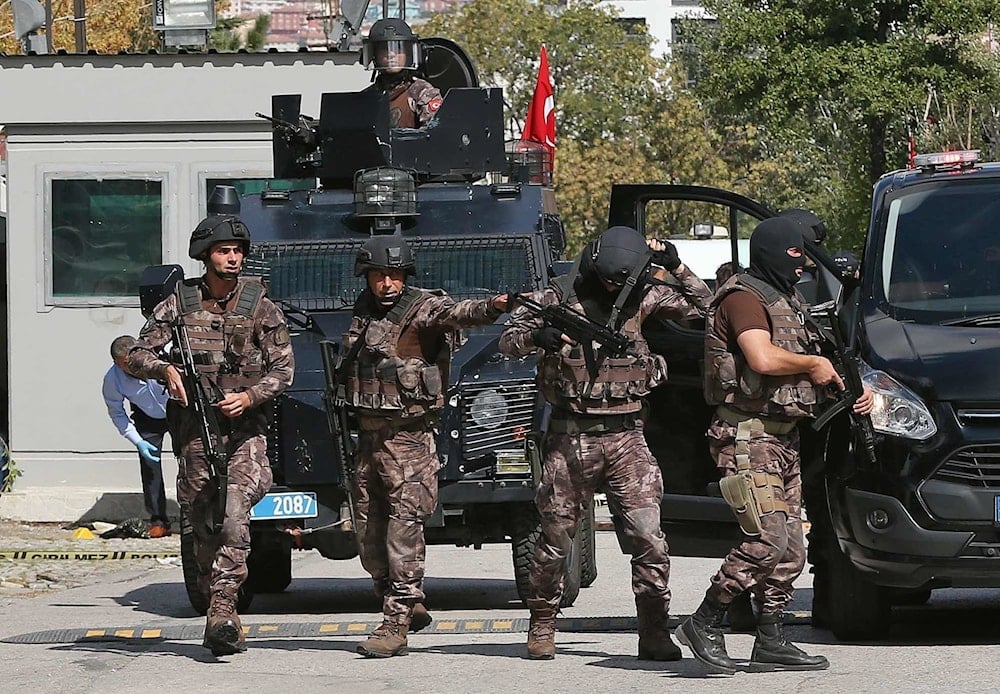Turkish intelligence warns of risks of recruitment by 'Israel'
Turkey’s MIT has warned that "Israel" may attempt to recruit agents in Turkey using methods developed during its covert operations against Iran, including psychological warfare and targeted assassinations.
-

Armed forces near the scene outside the Israeli embassy in Ankara, Turkey, where a solo attacker was shot and wounded on September 21, 2016. (AP Photo/Burhan Ozbilici)
Turkey's National Intelligence Organization (MIT) has issued a warning that "Israel" may attempt to recruit agents within Turkish territory, applying methods it refined during its covert operations against Iran. The warning, reported by Turkish news outlet Oda on Saturday, is based on an MIT intelligence analysis of "Israel's" recent strategy in the region.
According to the report, such recruitment methods are part of broader psychological warfare efforts aimed at destabilizing a target country, tactics that may now be redirected toward Turkey.
The MIT report accuses "Israel" of deliberately intensifying political and economic unrest in Iran by targeting and assassinating Iranian leaders. These operations, MIT suggests, serve a dual purpose: eliminating strategic figures and fostering the kind of disarray that facilitates the recruitment of local agents.
MIT warned that similar tactics could be deployed in Turkey and called on the government to proactively address the threat.
Iran claims to thwart Israeli-backed plot
Iran’s Intelligence Ministry announced in late July that it had foiled a plot orchestrated by "Israel"-backed "monarchist opposition" groups to incite riots in Tehran. The arrests followed "Israel's" June strike on Evin Prison, which reportedly left more than 70 people dead and dozens injured. Iranian authorities said over 120 suspects were detained across 23 regions of the country.
The warning from MIT comes in the wake of the 12-day Israeli war on Iran that erupted in mid-June. On June 13, "Israel" launched strikes targeting Iranian nuclear facilities, prominent military figures, nuclear scientists, and civilians, accusing Tehran of operating a covert military nuclear program, a charge Iran denied.
Iran retaliated with attacks on Israeli and US positions, including a strike on the US Al Udeid Air Base in Qatar following a US attack on Iran's nuclear sites.
In response to the emerging threat, MIT urged the Turkish government to foster national unity and social cohesion, continue with economic reforms, and raise public awareness about disinformation and online manipulations. These measures, the report argues, are crucial for preventing the kind of internal fragmentation that foreign actors, particularly "Israel", seek to exploit.
36 assassination attempts foiled
It is worth mentioning that Iran's Ministry of Intelligence detailed on July 28 that during the war, it conducted offensive espionage operations inside "Israel", recruiting agents from within the Israeli security establishment and obtaining documented intelligence in the process. Moreover, it said it infiltrated the Israeli Nuclear Information Vault before the war, providing Iran with essential intel of the precise locations of numerous sensitive targets inside "Israel".
In addition, Tehran utilized secret diplomatic channels to exchange information and intelligence with allied actors in the region, as well as issue regional warnings.
In terms of counter-espionage, Iran managed to arrest dozens of operatives and agents recruited by the Israeli Intelligence Agency Mossad across multiple Iranian provinces, while exposing Mossad agents involved in the economic and financial sectors set to perform sabotage missions.
Moreover, it neutralized Israeli operational sites, thwarting their missions, foiling 23 assassination attempts against high-level figures and officials, in addition to 13 attempts before the war, as well as averting sabotage plots targeting the Atomic Energy Organization of Iran and military facilities.

 3 Min Read
3 Min Read










